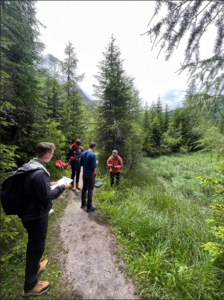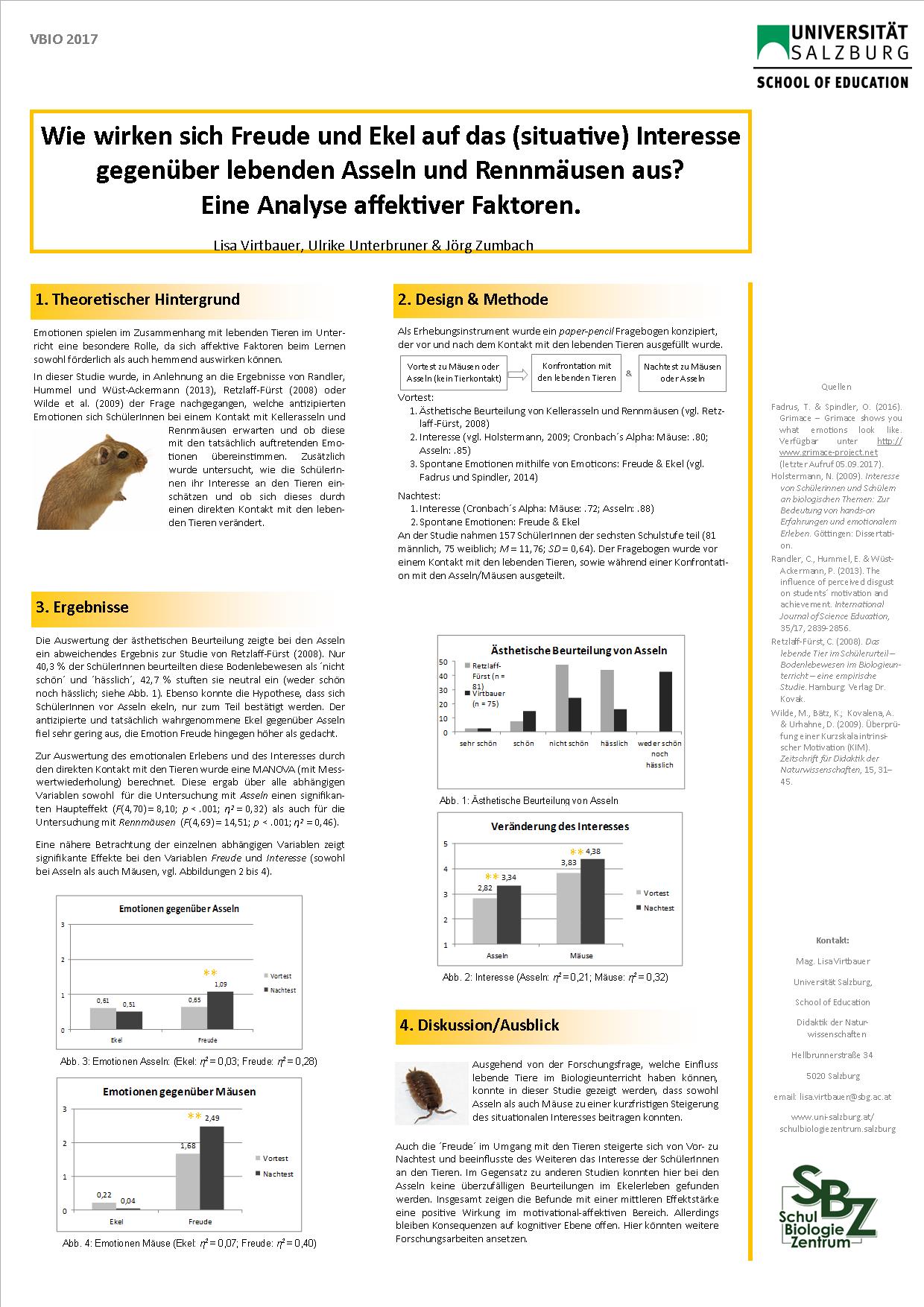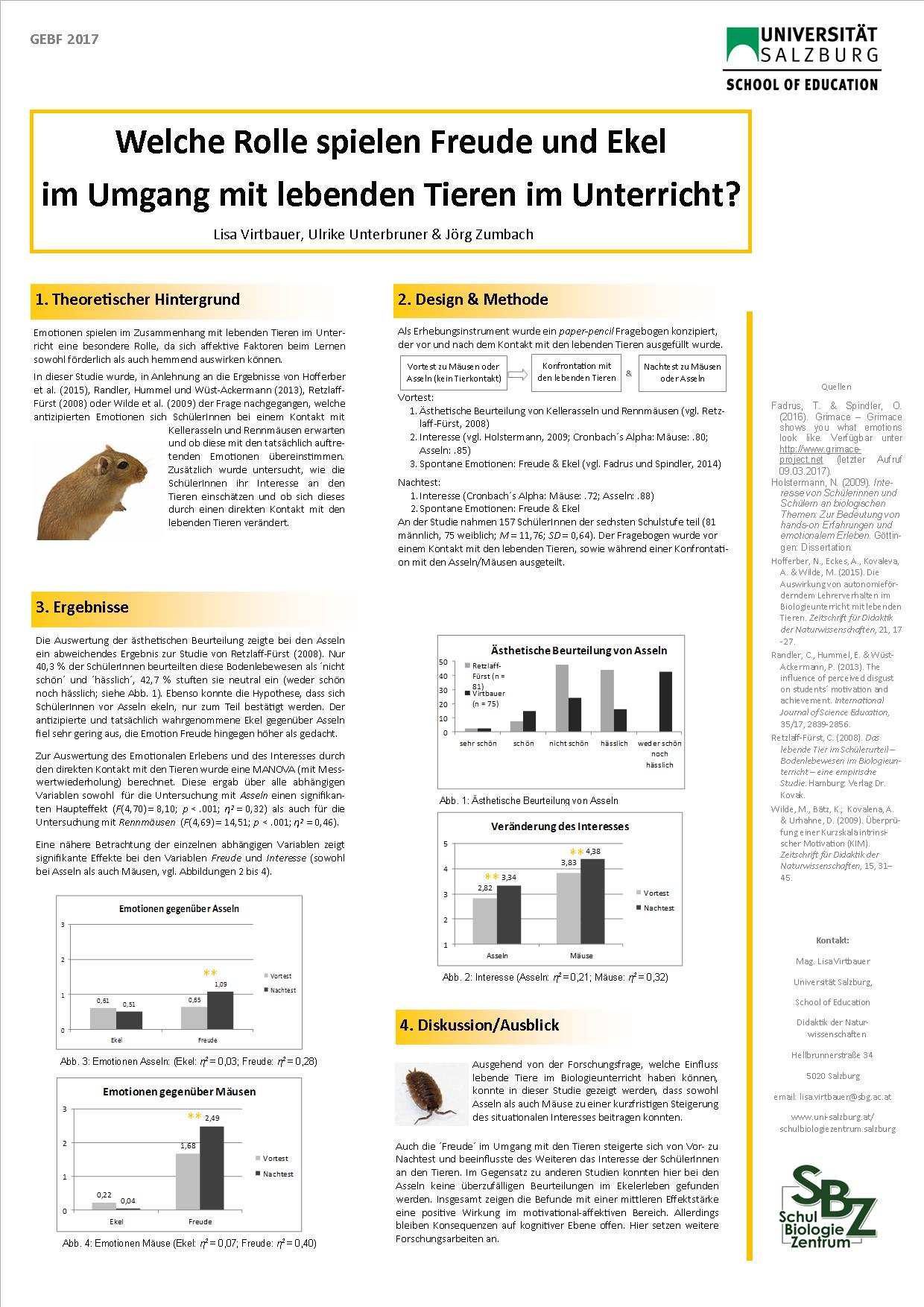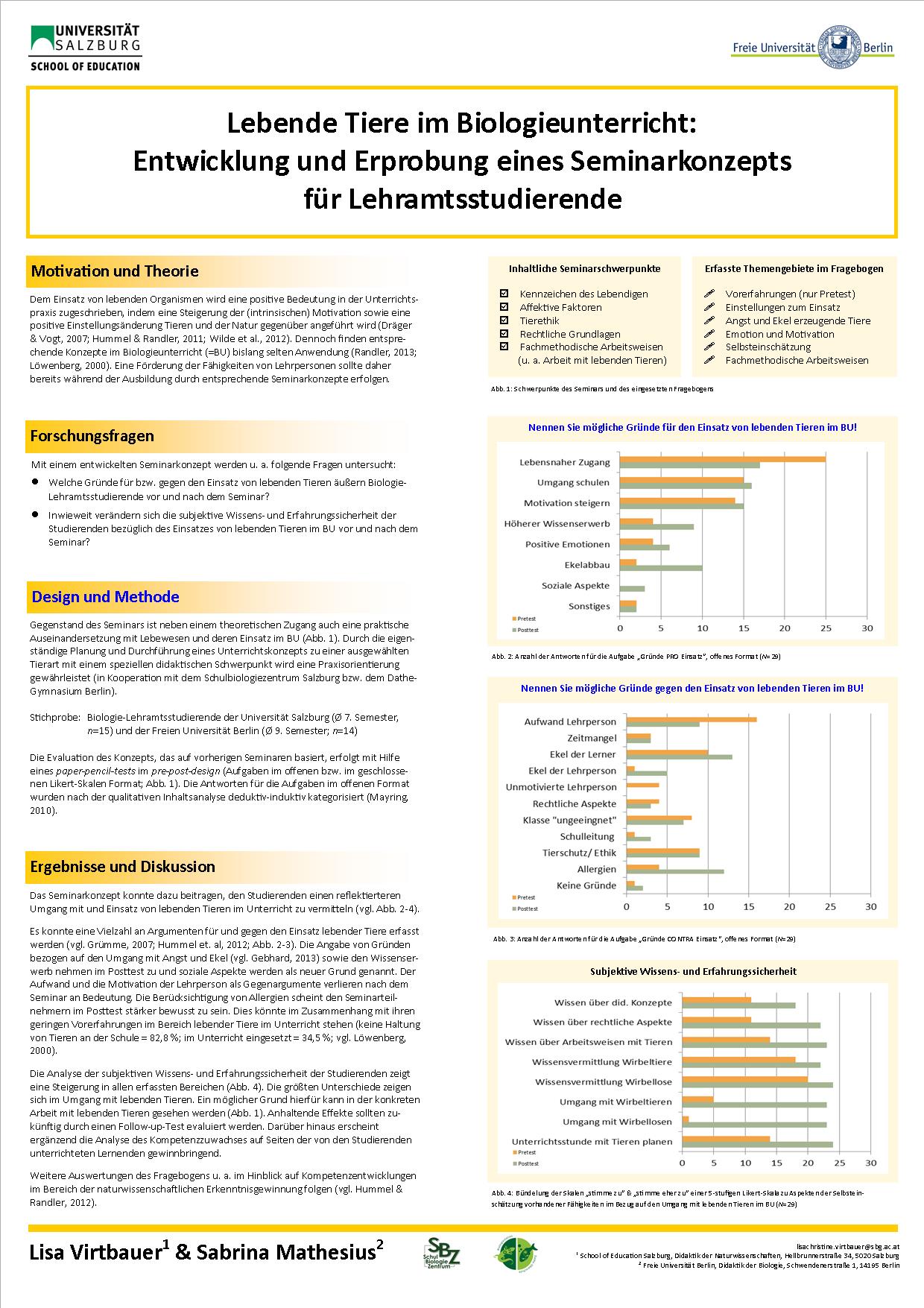2025
Dissertation
Climate Education and Digitalisation in Biology Teaching
Teachers and Digital Climate Education: An Empirical Analysis of Competencies and Effectiveness in Climate Education Programs
- What digital and subject-specific didactic competencies are needed for effective digital climate education?
- How sustainable are the learning gains from digital climate education programs for teachers?
- How do knowledge and attitudes of teachers change through the use of digital climate education programs?
- What competencies and experiences do teachers have regarding digital climate education programs?
- What challenges do teachers perceive when implementing digital climate education in their classrooms?
“What Future Awaits You?”
Future Visions, Environmental Anxiety, and Youth Vulnerability in the Age of Climate Change
Steinacher, F., Huber, A., & von Kotzebue, L.
ABSTRACT
Climate anxiety represents a growing challenge for science education, as it shapes how young people perceive and respond to environmental issues. This study explores which climate-related topics concerned Austrian students most in 2023, what fears and hopes they hold for the next 20 years, and how these have evolved over the past 35 years. A mixed-methods survey of 280 students combined quantitative measures of climate anxiety, perceived personal vulnerability, and environmental knowledge with open-ended questions about fears, hopes, and visions of the future. The findings reveal that environmental destruction remains the most frequently mentioned concern, while personal fears—especially biophobias—have significantly increased. A stronger sense of vulnerability correlates with higher climate anxiety, particularly among students with greater environmental knowledge. Comparisons with studies from 1989 and 2011 indicate that ecological concerns have remained constant, yet pessimism—especially among girls—has intensified. Students’ future visions are increasingly negative, with pessimistic individuals more often depicting nature as damaged or destroyed. The study highlights the need to address climate anxiety explicitly in science education in order to foster resilience and help students process environmental challenges constructively. By linking climate-related emotions with sustainability-oriented education, the study underlines the importance of combining scientific literacy with psychological support to foster a reflective and empowered engagement with future challenges.
Keywords: climate anxiety, emotions, environmental education, future-oriented science education
Dissertation
A Systematic and Empirical Analysis of Teachers’ Professional Competencies in Climate Change Education with Special Consideration of Computer Simulations
Maya Antonia Paasch, Angela Hof & Lena von Kotzebue
This project aims to demonstrate how a theory-driven testing instrument can systematically identify knowledge gaps and potential in teachers. The test instrument draws on the TPACK model and focuses specifically on teachers’ professional action competencies. The survey targets pre-service teachers in Biology and Geography and is based on a quantitative research design. After validating the instrument, comparisons will be made across different target groups—ranging from pre-service teachers and student teachers to in-service educators.
This comparison seeks to uncover knowledge deficits and identify continuing professional development needs. The results are intended to support the advancement of university-based teacher education and improve strategies for implementing digital climate education.
The dissertation focuses on evaluating teachers’ professional competencies in the field of climate change education, with an emphasis on the use of computer simulations. At the core lies the development, validation, and application of a test instrument that assesses disciplinary knowledge as well as simulation-specific, pedagogical, and technological competencies relevant to school-based climate change education. The goal is to prepare teachers for the effective use of computer simulations in climate education and to reduce uncertainties related to their application.
Computer Simulations in Climate Change Education – Development and Validation of a Test Instrument for Teachers’ Professional Knowledge
This research investigates how a theory-based test instrument can systematically detect knowledge gaps and professional potential in teachers. The instrument is grounded in the TPACK framework and highlights teachers’ professional action competencies. The study targets Biology and Geography education students using quantitative methods. After validation, the instrument will be used to compare different target groups—from pre-service teachers to student teachers and experienced educators.
These comparisons aim to identify knowledge gaps and training needs. The findings will contribute to the improvement of university-level teacher education and the refinement of strategies for digital climate change education.
Keywords: climate change education, computer simulations, professional competencies of teachers, TPACK model, education for sustainable development (ESD), digital climate education, teacher education, pre-service and in-service teachers, knowledge diagnostics, quantitative research, test instrument development, pedagogical content knowledge, technology-enhanced learning, science education, geography education
Dissertation
Long-Term Effects of Nature-Based Interventions for Biodiversity Conservation: A Case Study of the Young Citizen Science Project “PolliDiversity” on Environmental Awareness, Nature Connectedness, and Emotions
Verena Mayer & Lena von Kotzebue
Keywords: long-term effects, nature-based interventions, biodiversity conservation, Young Citizen Science, environmental awareness, nature connectedness, emotions, education for sustainable development (ESD), ecological education, environmental psychology, participatory research, scientific engagement, sustainable behavior, citizen science projects, nature experiences
Research Project
The Importance of Nature Observation in Biology Education for the Acquisition of Species Knowledge (BeoArt)
David Zezula, Anna Schneeberger & Lena von Kotzebue
ABSTRACT Changes in biodiversity and species richness represent an ongoing challenge and will play an increasingly important role in biology education. A foundational understanding of species identification is highly relevant—both on an individual and societal level. Only by recognizing and classifying the diversity of organisms within their ecological context can sustainable decisions be made. In times of climate change and biodiversity loss, developing awareness and understanding of species diversity is essential to engage meaningfully with scientifically and socially relevant ecological functions. The research project “BeoArt – The Importance of Nature Observation in Biology Education for the Acquisition of Species Knowledge” focuses on knowledge related to species identification and biodiversity, as well as on aspects such as students’ sense of connectedness with nature.

Research Project
Using Live Organisms in the Classroom
Mag. Dr. Lisa Virtbauer conducts research projects on the use of live animals in biology education. The content and findings of these projects are presented below in the form of posters that have been showcased at various academic conferences.
From research to classroom practice—this transfer takes place through the School Biology Center! Visit us [here] for more information.
POSTER PRESENTATION: Virtbauer, L., Unterbruner, U. & Zumbach, J. (2017): How do joy and disgust affect (situational) interest in live woodlice and gerbils? An analysis of affective factors. Poster presented at the VBIO – Conference of the Biology Education Section (FDdB) of the German Association for Biology, Life Sciences & Biomedicine (VBIO), Halle (Saa

POSTER PRESENTATION at the 5th Annual Conference of the Society for Empirical Educational Research (GEBF); March 12–15, 2017 in Heidelberg.

POSTER PRESENTATION: Virtbauer, L., & Mathesius, S. (2015, September). Living Organisms in Biology Education: Development and Evaluation of a Seminar Concept for Pre-Service Teachers. A cooperative project with Freie Universität Berlin. Poster presented at the VBIO – Conference of the Biology Education Section (FDdB) of the German Association for Biology, Life Sciences & Biomedicine (VBIO).

2024
EU-Project
Bringing Authenticity into the Course Room
Coherent Teaching and Learning Materials for Teacher Education in Inquiry-Based Learning (TeLeMaT-IBL)
TeLeMaT IBL stands for “Bringing Authenticity into the Course Room – Coherent Teaching and Learning Materials for Teacher Education in Inquiry-Based Learning”, an Erasmus+ project funded by the European Union (Project No. KA220-BW-23-36-151700).
The project is based on the observation that in science teacher education, particularly in the area of inquiry-based learning (IBL), there is a lack of teaching materials that reflect realistic classroom scenarios. In other words, there is a shortage of authentic resources that simulate actual teaching situations for the purpose of teacher training.
The aim of the project is to enhance teaching materials for both pre-service and in-service teachers through the use of Virtual Reality (VR), Augmented Reality (AR), interactive videos (H5P), animations, and real classroom materials (e.g. student experiment reports). This approach seeks to improve teacher education systematically across all training phases – from university studies to teacher traineeships and continuing professional development. In countries where only two phases exist (studies and professional development), the concept is adapted accordingly.
→ [Read more]
Ongoing Research
Differentiation in Biology Education
Lead: Priv.-Doz. MMag. Dr. Iris SchifflOne of the key challenges in teaching is to effectively support and promote students with diverse learning needs and backgrounds. This heterogeneity can relate to various areas:
- Academic performance
- Interests
- Prior knowledge
- Gender
- Cognitive abilities
- Social skills
- …
The goal of contemporary biology education must therefore be to design lessons that are both engaging and tailored to the performance levels of all students. This requires the ability to accurately diagnose students’ learning conditions (diagnostics in biology education) and to apply appropriate subject-specific teaching methods based on those insights.
Research in this field focuses on a range of topics and questions, including:
- Basic research (e.g. Which students benefit most from differentiated instruction?)
- Assessments of the current situation in biology classrooms in Austria (e.g. How is differentiation currently implemented?)
- Differentiation methods in biology education across various school levels
- Differentiated experimentation (e.g. How can experimental settings be designed so that students with different performance levels can benefit?)
- Differentiated assessment strategies
- Differentiation through various biological topics
Master’s theses and dissertations on these topics are always welcome!
Ongoing Research
Diagnostics in Biology Education
Lead: Priv.-Doz. MMag. Dr. Iris Schiffl
Assessing students’ performance is often equated with grading. In reality, however, diagnostics not only serve as the basis for grading, but are also an integral part of biology education, essential for adapting instruction to the individual needs of students. Consequently, two types of diagnostics are distinguished:
- Summative diagnostics, used to assess students’ performance after extended learning phases (e.g., tests or final assessments)
- Formative diagnostics, conducted continuously to track students’ learning progress (e.g., worksheets, classroom observations, discussions, homework, etc.)
Since the introduction of educational standards, competency-based final exams, and the new curriculum for upper secondary education in Austria (starting in the 2018/2019 academic year), the demands on teachers’ diagnostic competencies have increased significantly. Teachers must now be able to precisely assess their students’ competence levels in order to assign grades in line with competence catalogs and to prepare students adequately for final exams.
The aim of research on diagnostics in biology education is to support teachers in this task. In collaboration with the Austrian Federal Institute for Educational Research, Innovation and Development of the Austrian School System (BIFIE), a team from the science education group at the University of Salzburg contributed to the development of diagnostic tools (e.g., IKM – BIFIE materials for educational standards).
Research questions include:
- How do biological competencies develop in students, and how can they be diagnosed?
- What biological competencies do students possess at different school levels?
- What is the current level of diagnostic competence among teachers?
- How can teachers’ diagnostic skills be enhanced?
- How can teachers be supported through diagnostic tools in various formats (closed, semi-open, and open)?
Master’s theses and dissertations addressing these questions are always welcome!
Selected Publications: Schiffl, I. (2018). Kompetenzdiagnostik im Biologieunterricht. Hamburg: Verlag Dr. Kovač. Schiffl, I. (2018). How information literate are junior and senior biology students. Research in Science Education. Link Schiffl, I. & Remplbauer, C. (2018). Diagnosis of inquiry competencies using hands-on experiments with gerbils. In N. Gericke & M. Grace (Eds.), Challenges in Biology Education Research (pp. 335–350). Karlstad: University Printing Office. Schiffl, I. (2016). Informal assessment of competences in the context of science standards in Austria. Universal Journal of Educational Research, 4(6), 1406–1417. Schiffl, I. (2016). Science standards in Austria: From prototypic tasks to diagnosis. In J. Lavonen et al. (Eds.), Science Education Research: Engaging Learners for a Sustainable Future (ESERA 2015 Proceedings, pp. 2773–2784). Link Schiffl, I. & Weiglhofer, H. (2016). IKM – Tool for informal competence assessment in science education: Conception and evaluation. In M. Hammann & U. Gebhard (Eds.), Teaching and Learning Research in Biology Education (Vol. 7, pp. 249–264). Innsbruck: Studien Verlag. Schiffl, I. & Weiglhofer, H. (2016). Diagnostic assessment in biology education using the example of the informal competence measurement instrument. In G. Maresch & J. Zumbach (Eds.), Science Education Didactics: New Horizons in Biology, Geometry and Computer Science (pp. 27–41). Vienna: Facultas.




